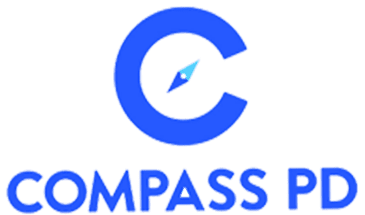Making the Most of Elementary Transitions: Quick and Easy Ideas for Teachers
By Dr. Carrie Hepburn and Dr. Sherri Lorton
Transitions. We all know them, live them, and let’s be honest—we’ve all wondered how to make them smoother. Whether it’s lining up to go to specials, waiting in the hallway to enter the cafeteria, or managing the moments before the buses arrive, transitions are a part of every teacher’s day. We’re not here to judge at Compass PD—we get it. Transitions are real life! But what if these little pockets of time could be opportunities for learning? You can turn transition time into productive moments that align with your learning goals with a few simple strategies.
Ready to make transitions work for you? Here are some low-prep, high-impact ideas that require little more than your creativity and a willingness to try something new.
Math Transition Ideas
- Subitizing Games
- Subitizing (the ability to quickly recognize a number without counting) is critical for developing number sense. Show students cards with dot patterns, roll dice, or use tally marks and have them call out the number. It’s quick, easy, and builds foundational skills starting in pre-K and beyond!
- Practicing Math Facts Verbally
- While students wait in line, call out math problems (e.g., “What is 8 + 7?” or “What is 12 divided by 4?”) and have them respond verbally. This keeps their minds active and reinforces basic facts.
- Finding Shapes in the Environment
- Challenge students to identify shapes they see around them while moving through the school. “Who can find a circle? A rectangle? What shape are the tiles on the floor?” This simple activity connects math to the real world.
- Number Talks
- Give students a mental math problem and ask them to solve it in their heads. Once they have an answer, let them explain their reasoning. For example, “How did you solve 25 + 19?” This encourages critical thinking and math discourse.

English Language Arts Transition Ideas
- Manipulating Sounds in Words
- Play with phonemes! Say a word and ask students to change one sound (e.g., “If the word is ‘cat,’ what’s the word if we change the /c/ to /h/?”). This builds phonemic awareness in a fun, engaging way.
- Rhyme Time
- Call out two words and have students give a thumbs up if they rhyme or a thumbs down if they don’t. For example: “Does ‘hat’ rhyme with ‘bat’?”
- Word Games
- Try synonyms and antonyms: “What’s another word for ‘happy’?” or “What’s the opposite of ‘big’?” Or play with analogies: “Cat is to kitten as dog is to …?”
- Vocabulary Practice
- Give students a term and have them define it in their own words. For example, “What does ‘predict’ mean?” or “What’s a synonym for ‘enormous’?” You can also incorporate morphology by asking students to identify prefixes, suffixes, or root words and use word parts to determine meanings. For instance, “What does ‘unhappy’ mean if we know ‘un-’ means ‘not’?” This builds a deeper understanding of vocabulary.

Why It Matters
Transition time doesn’t have to feel like “lost” time. By incorporating quick, purposeful activities into these moments, you can easily reinforce key concepts, keep students engaged, and manage the inevitable waiting periods. These strategies require minimal planning and zero additional resources—making them a win-win for busy teachers.
At Compass PD, we understand the realities of the classroom. We’re here to support you with practical, actionable strategies that fit seamlessly into your day. Transitions will always be part of teaching, but with a little creativity, they can become powerful moments for learning.
Do you have more ideas for transition time? We’d love to hear them! Please share your favorite strategies, and let’s keep the conversation going. Together, we can make every moment count.
References
Brenner, S.M. (2024, October 22). Teaching Students with Dyslexia 201: Diving Deeper into Practical Supports. https://compass-pd.com/part-1-of-teaching-students-with-dyslexia-201-diving-deeper-into-practical-supports/
Hepburn, C., Lorton, S. (Hosts). (2024, November 1). Quick Count, Big Impact: Subitizing in Early Math. https://www.buzzsprout.com/1857369/episodes/16031471
Hepburn, C., Evans, S. (Hosts). (2022, March 14). Number Talks with Stephanie Evans. Compass PD Podcast. https://www.buzzsprout.com/1857369/episodes/10247154
